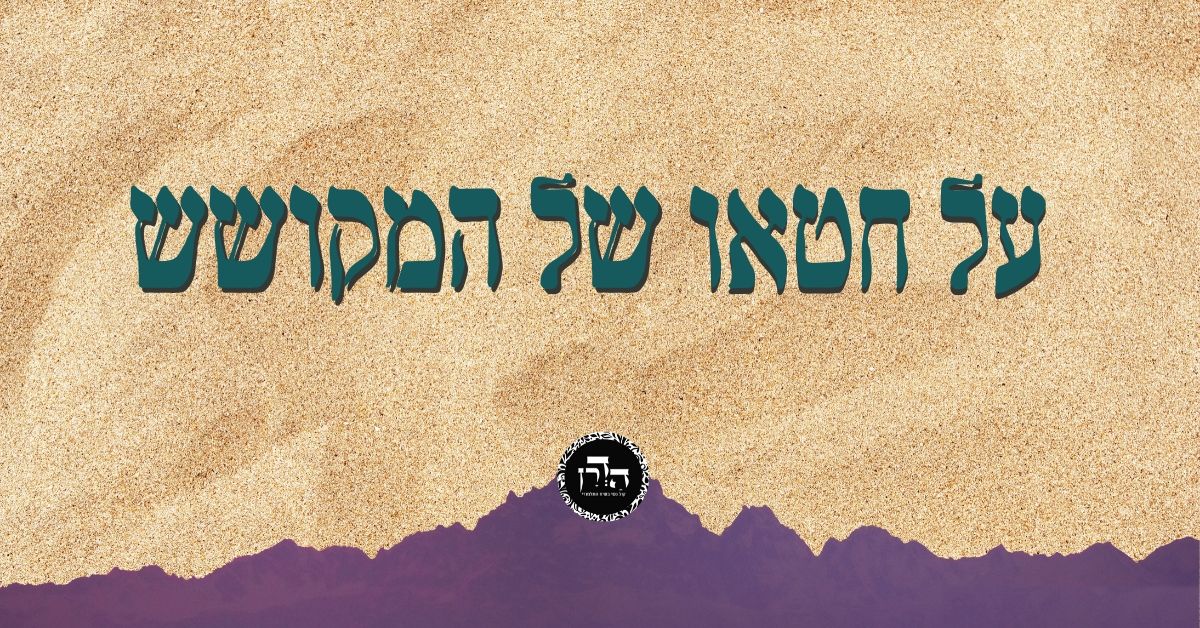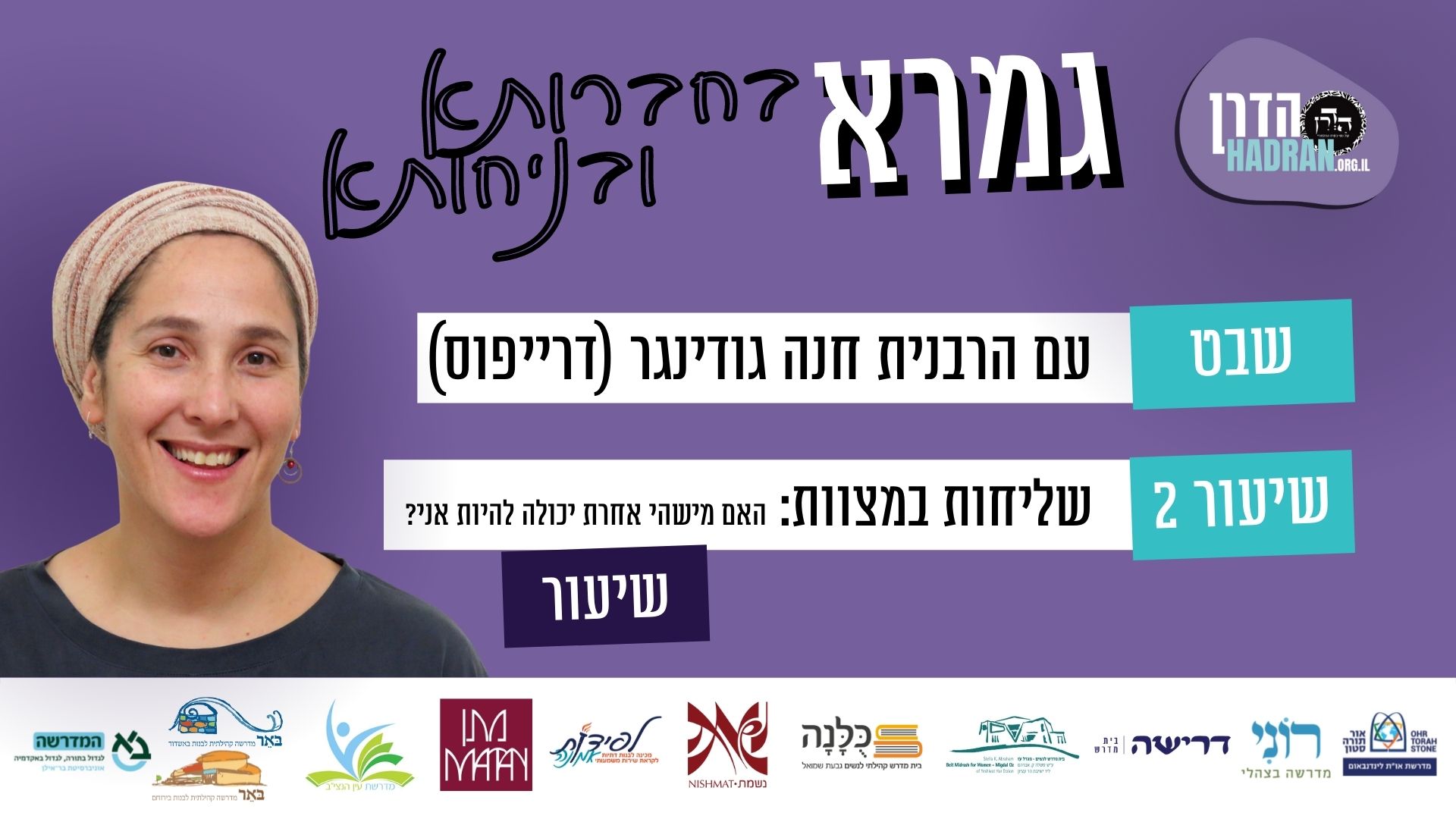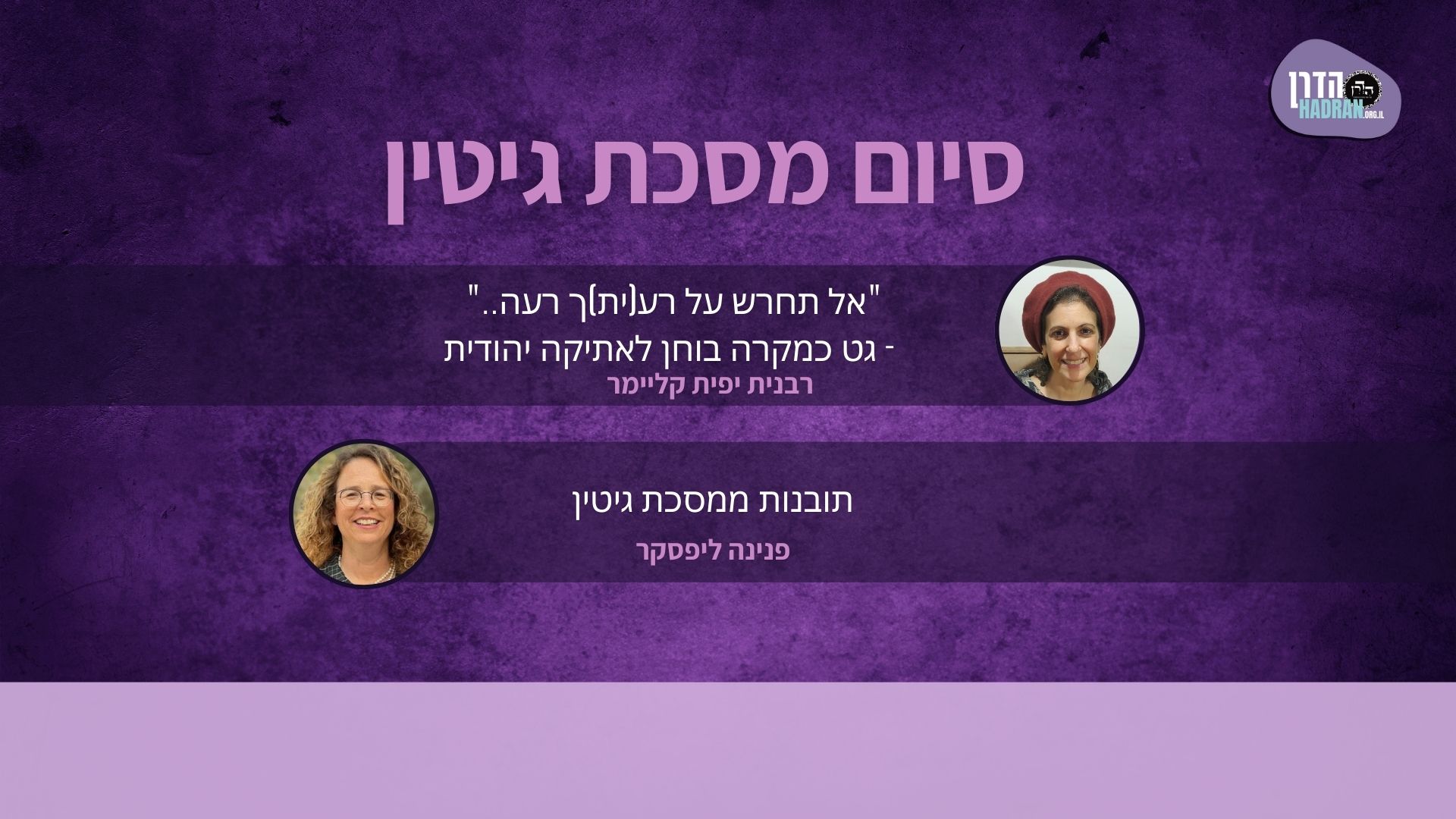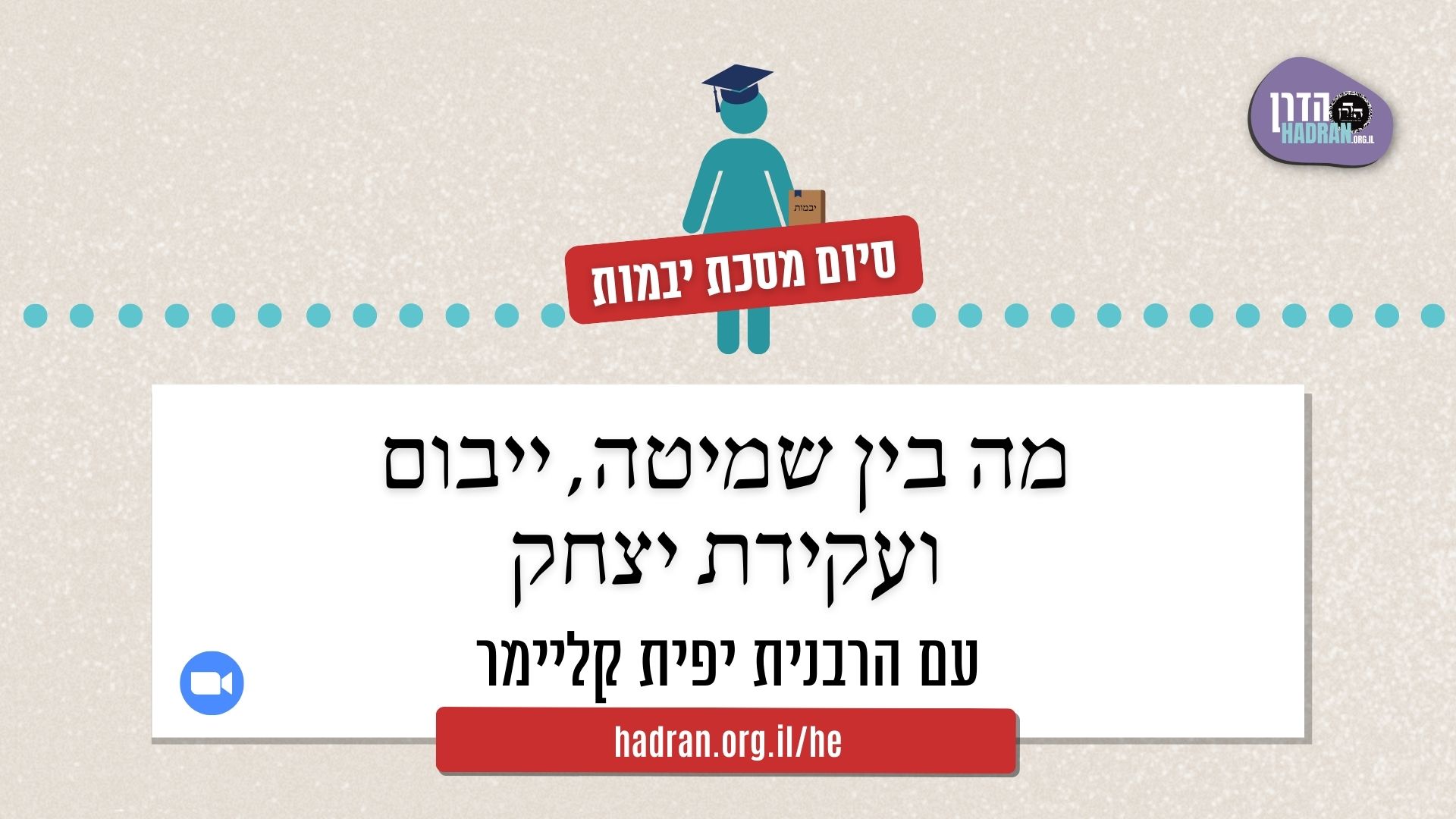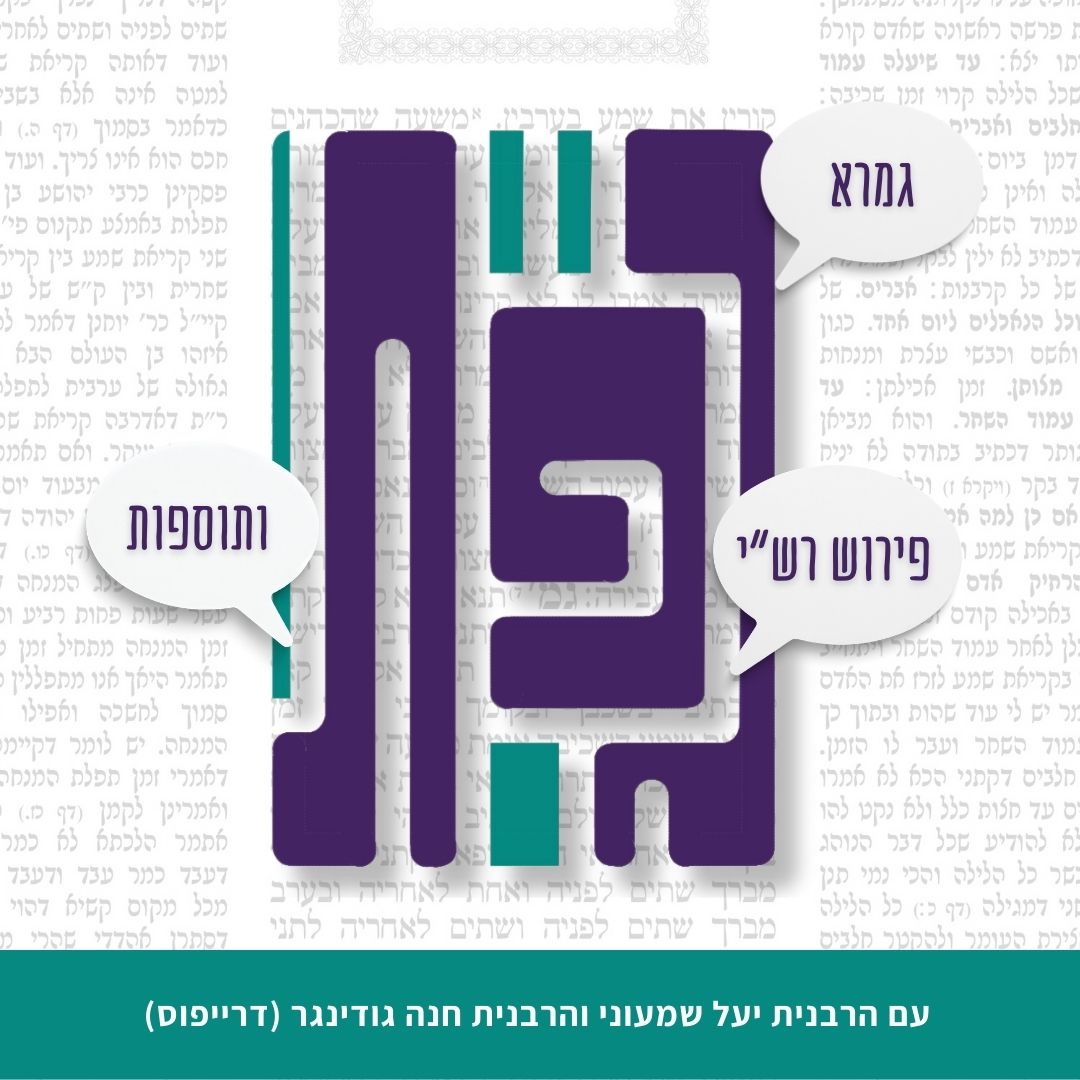הגמרא דנה בברייתא שציטטו קודם שבו מוזכר פרטים לגבי מתי בדיוק היה החרבן ובאיזה שנה במחזור של השמיטה זה היה. כמה שאלות עולות מתאריכים וספירות שרשומים במקומות אחרים והגמרא מנסה לענות על הקושיות.
רוצה להקדיש שיעור?
כלים
העמקה
רוצה להבין מה באמת קורה מתחת לפני השטח של הסוגיה?
שיעורים, פודקאסטים והרחבות של מיטב המורות שלנו יפתחו לך עוד זוויות וכיווני חשיבה.
חדשה בלימוד הגמרא?
זה הדף הראשון שלך? איזו התרגשות עצומה! יש לנו בדיוק את התכנים והכלים שיעזרו לך לעשות את הצעדים הראשונים ללמידה בקצב וברמה שלך, כך תוכלי להרגיש בנוח גם בתוך הסוגיות המורכבות ומאתגרות.
פסיפס הלומדות שלנו
גלי את קהילת הלומדות שלנו, מגוון נשים, רקעים וסיפורים. כולן חלק מתנועה ומסע מרגש ועוצמתי.
ערכין יב
אִיבַּעְיָא לְהוּ: נְסָכִים הַבָּאִים בִּפְנֵי עַצְמָן טְעוּנִין שִׁירָה אוֹ אֵין טְעוּנִין שִׁירָה? כֵּיוָן דְּאָמַר שְׁמוּאֵל בַּר נַחְמָנִי אָמַר רַבִּי יוֹנָתָן: ״מִנַּיִן שֶׁאֵין אוֹמְרִים שִׁירָה אֶלָּא עַל הַיַּיִן״ — אָמְרִינַן, אוֹ דִלְמָא עַל אֲכִילָה וּשְׁתִיָּה אָמְרִינַן, אַשְּׁתִיָּיה לְחוֹדַהּ לָא אָמְרִינַן?
§ A dilemma was raised before the Sages: With regard to libations that are brought by themselves, without an animal offering, do they require song on the part of the Levites as the libations are poured on the altar, or do they not require song? The Gemara explains the sides of the dilemma: Should it be assumed that since Shmuel bar Naḥmani says that Rabbi Yonatan says: From where is it derived that one recites a song of praise in the Temple only over wine, it can be inferred that we recite songs whenever wine is poured on the altar? Or perhaps we recite songs only upon the eating and drinking of the altar, i.e., when both an animal offering is burnt and a libation is also poured upon the altar, but upon the drinking of the altar alone, we do not recite songs.
תָּא שְׁמַע: רַבִּי יוֹסֵי אוֹמֵר: מְגַלְגְּלִין זְכוּת לְיוֹם זַכַּאי וְכוּ׳.
The Gemara seeks to resolve the dilemma through a baraita cited earlier. Come and hear: Rabbi Yosei says that a fortunate matter is brought about on an auspicious day, and a deleterious matter on an inauspicious day, e.g., the Ninth of Av, on which several tragedies have already occurred. As the Sages said: When the Temple was destroyed for the first time, that day was the Ninth of Av; and it was the conclusion of Shabbat; and it was the year after a Sabbatical Year; and it was the week of the priestly watch of Jehoiarib; and the priests and Levites were standing on their platform and singing the verse: “And He brought upon them their own iniquity, and He will cut them off in their own evil” (Psalms 94:23).
הַאי שִׁירָה מַאי עֲבִידְתַּיהּ? אִילֵּימָא דְּעוֹלַת חוֹבָה, מִי הֲוָה? בְּשִׁבְעָה עָשָׂר בְּתַמּוּז בָּטַל הַתָּמִיד! וְאֶלָּא דְּעוֹלַת נְדָבָה — וְהָא תָּנֵי רַב מָרִי בְּרֵיהּ דְּרַב כָּהֲנָא דְּלָא צְרִיכָא! אֶלָּא לָאו דִּנְסָכִין.
The Gemara analyzes the baraita: This song, what was its purpose? If we say that it accompanied an obligatory burnt offering, was there any obligatory communal burnt offering sacrificed at that time? The daily offering had ceased to be brought on the seventeenth of Tammuz, three weeks before the Ninth of Av. Rather, it would seem that this song accompanied a voluntary burnt offering. The Gemara asks: But didn’t Rav Mari, son of Rav Kahana, teach that a voluntary burnt offering does not require song? Rather, is it not the case that the song accompanied libations brought without an animal offering? This would prove that the Levites sing when a wine libation is brought, even without an animal offering.
אָמַר רָבָא, וְאִיתֵּימָא רַב אָשֵׁי: וְתִסְבְּרָא?! שִׁירָה דְּיוֹמֵיהּ ״לַה׳ הָאָרֶץ וּמְלוֹאָהּ״, ״וַיָּשֶׁב עֲלֵיהֶם אֶת אוֹנָם״ בְּשִׁירָה דְּאַרְבְּעָה בְּשַׁבָּא הוּא! אֶלָּא אִילְיָיא בְּעָלְמָא הוּא דִּנְפַל לְהוּ בְּפוּמַּיְיהוּ.
Rava said, and some say it was Rav Ashi who said: And can you understand that this song was recited over any offering? The song of the day for Sunday, which is when the baraita says that the Temple was destroyed, is the psalm beginning with the verse: “A psalm of David. The earth is the Lord’s, and the fullness thereof” (Psalms 24:1). And yet the verse that the baraita says that the Levites were singing: “And He brought upon them their own iniquity,” is in the song for Wednesday, not the song for Sunday. Rather, it was merely a portentous lamentation that came into their mouths, not a song recited over an offering. Consequently, no proof can be offered from this baraita.
וְהָא ״עוֹמְדִים עַל דּוּכָנָן״ קָתָנֵי! כִּדְרֵישׁ לָקִישׁ, דְּאָמַר רֵישׁ לָקִישׁ: אוֹמֵר שִׁירָה שֶׁלֹּא עַל הַקׇּרְבָּן. אִי הָכִי, בִּנְסָכִים נָמֵי לֵימָא! נָפֵיק מִינֵּיהּ חוּרְבָּא.
The Gemara asks: But isn’t it taught in the baraita that the Levites were standing on their platform near the altar, which is the place where they sing to accompany offerings? The Gemara answers: This can be explained in accordance with the opinion of Reish Lakish. As Reish Lakish says: The Levites are permitted to recite a song on the platform even when it is not for an offering. The Gemara asks: If so, let them also recite a song for libations that are brought without an animal offering, even if that is not required. The Gemara answers: This could result in a mishap, as the Levites might assume that just as singing for libations which are brought without an animal offering is optional, so too, singing for libations that accompany an animal offering is also optional.
גּוּפָא, רַבִּי יוֹסֵי אוֹמֵר: מְגַלְגְּלִין זְכוּת לְיוֹם זַכַּאי וְכוּ׳.
§ The Gemara discusses the matter itself cited in the baraita. Rabbi Yosei says: A fortunate matter is brought about on an auspicious day, and a deleterious matter on an inauspicious day. As the Sages said: When the Temple was destroyed for the first time, that day was the Ninth of Av; and it was the conclusion of Shabbat; and it was the year after a Sabbatical Year.
בָּרִאשׁוֹנָה, בְּמוֹצָאֵי שְׁבִיעִית מִי מַשְׁכַּחַתְּ לַהּ? וְהָכְתִיב: ״בְּעֶשְׂרִים וְחָמֵשׁ שָׁנָה לְגָלוּתֵנוּ, בְּרֹאשׁ הַשָּׁנָה בֶּעָשׂוֹר לַחֹדֶשׁ, בְּאַרְבַּע עֶשְׂרֵה שָׁנָה אַחַר אֲשֶׁר הוּכְּתָה הָעִיר״! אֵיזוֹ הִיא שָׁנָה שֶׁרֹאשׁ הַשָּׁנָה בֶּעָשׂוֹר לַחֹדֶשׁ? הֱוֵי אוֹמֵר: זֶה יוֹבֵל.
The Gemara asks: Can you find such a possibility, that when the Temple was destroyed for the first time it was in the year after a Sabbatical Year? But isn’t it written in a verse that Ezekiel experienced a prophecy “in the twenty-fifth year of our captivity, at the beginning of the year, on the tenth day of the month, in the fourteenth year after the city was smitten” (Ezekiel 40:1)? Which is the year when the beginning of the year is on the tenth of the month? You must say that this is referring to the Jubilee, which begins on Yom Kippur, the tenth of Tishrei.
וְאִי סָלְקָא דַעְתָּךְ בְּחַד בְּשָׁבוּעַ חֲרוּב, מֵחַד בְּשָׁבוּעַ לְחַד בְּשָׁבוּעַ — תַּמְנֵי, לְחַד בְּשָׁבוּעַ אַחֲרִינָא — חֲמֵשׁ עֶשְׂרֵה הָוְויָין.
But if it enters your mind to say that the Temple was destroyed in the first year of the Sabbatical cycle, it is impossible that the Jubilee, which follows a Sabbatical Year, occurred on the fourteenth year after the destruction of the Temple: Counting from the first year of the Sabbatical cycle to the next first year of the Sabbatical cycle, one arrives at year eight. If one continues to count to the first year of yet another Sabbatical cycle, it is the fifteenth year after the year of the destruction of the Temple, not the fourteenth year.
אָמַר רָבִינָא: בְּאַרְבַּע עֶשְׂרֵה שָׁנָה אַחַר שָׁנָה שֶׁהוּכְּתָה הָעִיר.
The Gemara answers: Ravina said: The meaning of the verse is that it was in the fourteenth year after the year that the city was smitten. The year of the destruction is not counted as year one of the fourteen years; rather, year one was the following year. The destruction took place in the thirty-sixth year of the Jubilee cycle, and therefore the Jubilee occurred fourteen years later.
אִי הָכִי, ״בְּעֶשְׂרִים וְחָמֵשׁ שָׁנָה״? עֶשְׂרִים וָשֵׁשׁ הָוְיָין! דְּאָמַר מָר: גָּלוּ בְּשֶׁבַע, גָּלוּ בִּשְׁמוֹנֶה.
The Gemara objects: If so, when the verse states that Ezekiel’s prophecy fourteen years after the destruction of the Temple was in the twenty-fifth year of captivity, that is not precise; it was actually the twenty-sixth year of captivity. As the Master says in a baraita: The Jews were exiled first in Nebuchadnezzar’s seventh year, and they were also exiled first in Nebuchadnezzar’s eighth year. This first exile took place during Nebuchadnezzar’s eighth year counting from the beginning of his reign; it was Nebuchadnezzar’s seventh year counting from the year he subjugated Jehoiakim, king of Judah.
גָּלוּ בִּשְׁמוֹנֶה עֶשְׂרֵה, גָּלוּ בִּתְשַׁע עֶשְׂרֵה.
The baraita continues: They were then exiled a second time in Nebuchadnezzar’s eighteenth year, and they were exiled in Nebuchadnezzar’s nineteenth year, when the Temple was destroyed. This statement will be explained later.
מִשַּׁב וְעַד תַּמְנֵי סְרֵי — חַד סְרֵי, וַחֲמֵשׁ עֶשְׂרֵה — עֶשְׂרִים וְשֵׁית הָוְיָא!
The Gemara explains the objection: Now, from the seventh year, when the first exile occurred, until the eighteenth year, when the second exile occurred, in conjunction with the Temple’s destruction, is eleven years, not counting the year of the destruction, and an additional fifteen years, until the date mentioned in the verse in Ezekiel, equals twenty-six years from the first exile, not twenty-five.
אָמַר לָךְ רָבִינָא: וּלְדִידָךְ מִי נִיחָא? מִכְּדֵי גָּלוּ נָמֵי בִּתְשַׁע עֶשְׂרֵה, מִשַּׁב וְעַד תְּשַׁסְרֵי — תַּרְתֵּי סְרֵי, וְאַרְבַּע סְרֵי — עֶשְׂרִים וְשֵׁית הָוְיָין! אֶלָּא מַאי אִית לָךְ לְמֵימַר? לְבַר מִשַּׁתָּא דִּגְלוֹ בַּהּ. לְדִידִי נָמֵי — לְבַר מִשַּׁתָּא דִּגְלוֹ בַּהּ.
The Gemara explains that Ravina could have said to you: And according to you, who maintains that the fourteen years mentioned in the verse include the year of the destruction of the Temple, does it work out well? Now, they were also exiled in the nineteenth year, and it was then that the Temple was destroyed. From the seventh year until the nineteenth year is twelve years, and an additional fourteen years until the date mentioned in the verse in Ezekiel equals twenty-six years from the first exile, not twenty-five. Rather, what have you to say? That the twenty-five years are counted separate from the year when they were exiled for the first time. According to my opinion also, I can say that the twenty-five years are separate from the year when they were exiled for the first time.
מִכׇּל מָקוֹם, תְּשַׁסְרֵי לְרָבִינָא קַשְׁיָא!
The Gemara objects: In any case, the assertion of the baraita that the destruction of the Temple occurred in the nineteenth year is difficult for Ravina, because there are eleven years from the first exile until the year of the destruction, not counting the year of the exile or the year of the destruction, and then an additional fifteen years, including the year of the destruction, until the date mentioned in the verse in Ezekiel, which is a total of twenty-six years, not twenty-five.
מִי סָבְרַתְּ שָׁלֹשׁ גָּלִיּוֹת הֲוַי? גָּלוּ בְּשֶׁבַע לְכִיבּוּשׁ יְהוֹיָקִים, שֶׁהִיא שְׁמוֹנֶה לִנְבוּכַדְנֶצַּר, גָּלוּ בִּשְׁמוֹנֶה עֶשְׂרֵה לְכִיבּוּשׁ יְהוֹיָקִים, שֶׁהִיא תְּשַׁע עֶשְׂרֵה לִנְבוּכַדְנֶצַּר.
The Gemara explains: Do you hold that there were three separate exiles, one in the seventh or eighth year, a second one in the eighteenth year, and a third one in the nineteenth year? In truth there were only two exiles: They were exiled in the seventh year from Nebuchadnezzar’s subjugation of Jehoiakim, which was the eighth year of Nebuchadnezzar’s reign. They were then exiled a second time, when the Temple was destroyed, in the eighteenth year from the subjugation of Jehoiakim, which was actually in the nineteenth year of Nebuchadnezzar’s reign. Consequently, there were eleven years from the first exile to the destruction of the Temple, not counting the year of the exile, and another fourteen years until the verse in Ezekiel, which equals a total of twenty-five years.
דְּאָמַר מָר: שָׁנָה רִאשׁוֹנָה כִּיבֵּשׁ נִינְוֵה,
The Gemara corroborates its interpretation of the baraita. As the Master says: In the first year of his reign, Nebuchadnezzar conquered Nineveh;
שְׁנִיָּה עָלָה וְכִיבֵּשׁ יְהוֹיָקִים.
in his second year he ascended to Eretz Yisrael and conquered Jehoiakim.
וְכֵן בַּשְּׁנִיָּה.
§ The Gemara continues its discussion of the baraita, which teaches: When the Temple was destroyed for the first time, that day was the Ninth of Av; and it was the conclusion of Shabbat; and it was the year after a Sabbatical Year; and likewise, the same happened when the Second Temple was destroyed.
וּשְׁנִיָּה בְּמוֹצָאֵי שְׁבִיעִית מִי מַשְׁכַּחַתְּ לַהּ? מִכְּדִי בַּיִת שֵׁנִי כַּמָּה קָם? אַרְבַּע מְאָה וְעֶשְׂרִים. אַרְבַּע מְאָה — תְּמָנְיָא יוֹבֵלֵי, אַרְבֵּסְרֵי — תְּרֵי שָׁבוּעַ, פָּשׁוּ לְהוּ שֵׁית, הָוֵה לֵיהּ בְּשִׁיתָּא בַּשָּׁבוּעַ.
The Gemara asks: Can you find such a possibility, that the Second Temple was destroyed in the year after a Sabbatical Year? Now, for how many years did the Second Temple stand? It stood for 420 years. Four hundred years include exactly eight Jubilees, as the Jubilee cycle is fifty years. An additional fourteen years consist of two Sabbatical cycles. There are six years remaining during which the Temple stood, which means that the last year was the sixth year of the Sabbatical cycle, and therefore when the Temple was destroyed the following year it was a Sabbatical Year, not the year after the Sabbatical Year.
הָא מַנִּי? רַבִּי יְהוּדָה הִיא, דְּאָמַר: ״שְׁנַת חֲמִשִּׁים עוֹלָה לְכָאן וּלְכָאן״, אַיְיתִי תְּמָנְיָא מִתְּמָנְיָא יוֹבֵלֵי, וְהָנֵי שֵׁית — הָוֵי אַרְבֵּיסַר, אִישְׁתְּכַח דִּבְמוֹצָאֵי שְׁבִיעִית חֲרוּב.
The Gemara answers: In accordance with whose opinion is this baraita stated? It is in accordance with the opinion of Rabbi Yehuda, who says that the fiftieth year is counted for here and for there, i.e., it is both the Jubilee Year and the first year of the next Sabbatical cycle and Jubilee cycle, and therefore each Jubilee cycle is only forty-nine years rather than fifty years. Consequently, when calculating the number of years of the Sabbatical and Jubilee cycles until the destruction of the Second Temple, bring an additional eight years from the eight complete Jubilee cycles during which the Temple stood. The eight years and those six years that remained according to the previous calculation equal fourteen years, which are two complete Sabbatical cycles. Therefore, it is found that the Second Temple was destroyed in the year following the Sabbatical Year.
אִי רַבִּי יְהוּדָה, בָּרִאשׁוֹנָה לָא מַשְׁכַּחַתְּ לַהּ! דְּתַנְיָא: שִׁבְעָה עָשָׂר יוֹבֵלוֹת מָנוּ יִשְׂרָאֵל מִשֶּׁנִּכְנְסוּ לָאָרֶץ וְעַד שֶׁיָּצְאוּ, וְאִי אַתָּה יָכוֹל לוֹמַר מִשָּׁעָה שֶׁנִּכְנְסוּ מָנוּ, שֶׁאִם אַתָּה אוֹמֵר כֵּן — נִמְצָא בַּיִת חָרֵב בִּתְחִילַּת יוֹבֵל, וְאִי אַתָּה מוֹצֵא ״בְּאַרְבַּע עֶשְׂרֵה שָׁנָה אַחַר אֲשֶׁר הֻכְּתָה הָעִיר״.
The Gemara objects: But if one explains the baraita in accordance with the opinion of Rabbi Yehuda, the first clause of the baraita is problematic, as you do not find that the first time the Temple was destroyed was in the year after the Sabbatical Year. As it is taught in a baraita: The Jewish people counted seventeen Jubilees from when they entered Eretz Yisrael until they left, when the First Temple was destroyed. And you cannot say that they counted from the time they entered, because if you say this, the result is that the Temple was destroyed at the beginning of the Jubilee cycle, and you do not find that the Jubilee Year was “in the fourteenth year after the city was smitten” (Ezekiel 40:1).
אֶלָּא צֵא מֵהֶם שֶׁבַע שֶׁכִּיבְּשׁוּ, וְשֶׁבַע שֶׁחִילְּקוּ, וְאַתָּה מוֹצֵא ״בְּאַרְבַּע עֶשְׂרֵה שָׁנָה אַחַר אֲשֶׁר הֻכְּתָה הָעִיר״.
Rather, remove from them the seven years when they conquered the land and the seven years when they divided the land, as they did not start counting the first Jubilee cycle until after those events. And you then find that the Jubilee Year was “in the fourteenth year after the city was smitten.”
וְאִי רַבִּי יְהוּדָה, אַיְיתִי שַׁבְסְרֵי מִשַּׁבְסְרֵי יוֹבֵלֵי, שְׁדִי אַהָנֵי — הֲוָה לֵיהּ בִּתְלָתָא בַּשָּׁבוּעַ!
The Gemara explains the difficulty from this baraita: But if one holds in accordance with the opinion of Rabbi Yehuda, that each Jubilee cycle is forty-nine years rather than fifty years, you must bring an additional seventeen years, one from each of the seventeen Jubilee cycles and add them to these seventeen cycles, and it turns out that the destruction of the Temple was in the third year of the Sabbatical cycle.
הָנָךְ שְׁנֵי דְּאַגְלִינְהוּ סַנְחֵרִיב, עַד דַּאֲתָא יִרְמְיָה אַהְדְּרִינְהוּ — לָא קָחָשֵׁיב לְהוּ.
The Gemara answers: Throughout those years from when Sennacherib exiled the ten tribes until Jeremiah came and returned them to their land, they did not count the Jubilee cycle, as the Jubilee applies only when all twelve tribes are in their ancestral lands. When the exiles returned, a new Jubilee cycle was started, and the Temple was destroyed thirty-six years later, in the year after a Sabbatical Year.
אִיבָּעֵית אֵימָא: לְעוֹלָם רַבָּנַן, וְכִי קָתָנֵי ״וְכֵן בַּשְּׁנִיָּה״ — אַשְּׁאָרָא.
The Gemara suggests a second answer to its question about the statement of the baraita which equates the destructions of the First Temple and the Second Temple. And if you wish, say instead: Actually, the baraita is in accordance with the opinion of the Rabbis, and when it teaches: And likewise, the same happened when the Second Temple was destroyed, it is not asserting that the Temple was destroyed in a year after a Sabbatical Year, because in fact the Second Temple was destroyed during a Sabbatical Year. Rather, it is referring to the other details the baraita provides with regard to the timing of the destruction, i.e., that it occurred on the Ninth of Av and on a Sunday.
הָכִי נָמֵי מִסְתַּבְּרָא, דְּאִי לָא תֵּימָא הָכִי, מִשְׁמַרְתּוֹ שֶׁל יְהוֹיָרִיב בַּשְּׁנִיָּה מִי הֲוַאי?
The Gemara comments: So too, it is reasonable to conclude that not all of the details pertaining to the destruction of the First Temple also apply to the destruction of the Second Temple. As, if you do not say so, then with regard to the statement that the destruction occurred during the week of the priestly watch of Jehoiarib, was the priestly watch of Jehoiarib present during the time of the Second Temple?
וְהָתַנְיָא: אַרְבַּע מִשְׁמָרוֹת עָלוּ מִן הַגּוֹלָה — יְדַעְיָה וְחָרִים פַּשְׁחוּר וְאִימֵּר, עָמְדוּ נְבִיאִים שֶׁבֵּינֵיהֶם וְחִלְּקוּם לְעֶשְׂרִים וְאַרְבַּע מִשְׁמָרוֹת, בְּלָלוּם וּנְתָנוּם בַּקַּלְפִּי, בָּא יְדַעְיָה וְנָטַל חֶלְקוֹ וְחֵלֶק חֲבֵירָיו שֵׁשׁ,
But isn’t it taught in a baraita that the watch of Jehoiarib did not exist during the Second Temple era? As it is taught: Only four priestly watches ascended from the Babylonian exile, while the other twenty stayed in Babylonia. And these are the watches who returned: The descendants of Jedaiah, Harim, Pashḥur, and Immer. The prophets among those who returned arose and divided these four families into twenty-four watches. They achieved this as follows: They wrote the names of these new twenty-four watches on pieces of paper, mixed them up, and put them in a receptacle [kalpi] from which lots were drawn. A representative from the family of Jedaiah came and drew his portion and the lot of five other watches, for a total of six.
